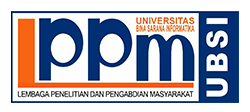ANALISIS POTENSI WISATA TEGAL BALONG DALAM PENENTUAN STRATEGI PENGEMBANGAN PARIWISATA BERKELANJUTAN
Sari
ABSTRAK
Penelitian ini bertujuan untuk (1) mengetahui potensi kepariwisataan; (2) kesadaran masyarakat akan pentingnya pariwisata dan (3) mengetahui intensi kewirausahaan sosial masyarakat yang dalam rangka pengembangan pariwisata yang berkelanjutan (sustainable tourism) di Dusun Tegalbalong, Kalurahan Bimomartani, Kapanewon Ngemplak, Kabupaten Sleman. Penelitian ini adalah penelitian deskriptif kualitatif. Metode observasi, wawancara dan studi pustaka digunakan mendapatkan informasi mengenai potensi kepariwisataan. Analisis deskriptif kualitatif digunakan untuk memformulasikan Strategi Pengembangan Pariwisata Berkelanjutan Tegal Balong berdasarkan Analisis SWO. Hasil penilitian ini menunjukkan adanya potensi Pancuran Tuk Bulus yang dapat dikembangkan menjadi destinasi wisata yang berkelanjutan karena potensi alam, budaya dan intensi kewirausahaan sosial masyarakt yang kuat. Hal lain yang ditemukan berkaitan dengan cukup tingginya kesadaran pariwisata dan intensi kewirausahaan social masyarakat di Dusun Tegalbalong, Kalurahan Bimomartani, Kapanewon Ngemplak, Kabupaten Sleman.
Kata kunci: pariwisata berkelanjutan, analisis SWOT, intensi kewirausahaan sosial, unique selling point
ABSTRACT
This study aims to (1) determine the tourism potential; (2) public awareness of the importance of tourism and (3) know the intentions of community social entrepreneurship in the context of developing sustainable tourism (sustainable tourism) in Tegalbalong Hamlet, Bimomartani Village, Kapanewon Ngemplak, Sleman Regency. This research is qualitative descriptive research. Methods of observation, interviews, and literature study are used to obtain information about tourism potential. Qualitative descriptive analysis was used to formulate the Tegal Balong Sustainable Tourism Development Strategy based on the SWO Analysis. The results of this study indicate that there is a potential for Pancuran Tuk Bulus which can be developed into a sustainable tourist destination because of the potential for nature, culture, and the community's strong social entrepreneurial intention. Another thing that was found was related to the high level of tourism awareness and social entrepreneurship intentions of the community in Tegalbalong, Bimomartani Village, Kapanewon Ngemplak, Sleman.
Keywords: sustainable tourism, SWOT analysis, social entrepreneurship intention, a unique selling point.
Teks Lengkap:
PDFReferensi
Alexander Trukhachev. Methodology for Evaluating the Rural Tourism Potentials: A Tool to Ensure Sustainable Development of Rural Settlements, Sustainability, Vol 7 pp 3052-3070, 2015
Cooper, C., Fletcher, J., Gilbert, D.G. and Wanhill, S, (2005). Tourism; Principle and Practice, Third Edition, Harlow. Prentice-Hall.
Creswell, J.W. (2010). Research Design Pendekatan Kualitatif, Kuantitatif, dan Mixed.Yogyakarta : Pustaka Pelajar
Getz (1992). The Tourism Area Lyfe Cycle Vol.1, Applications and Modifications. Channel View Publications. Gutierrez, E., Lamoureux, K., Matus S., dan Sebunya, K (2005). Linking communities, Tourism & Conservation. Conservation International and The George Washington University. J.R. Brent Ritchie and Geoffry I. Crouch. A Model of Destination Competitiveness. Revista De Administracao Publica
Ghozali, I. (2014). Aplikasi Analisis Multivariate Dengan Program IBM SPSS 23 (Edisi 8) Cetakan ke VIII. Semarang: Badan Penerbit Universitas Dioponegoro.
Gunawijaya, Jajang, dkk. (2016). Model Pengembangan Dan Kajian Destinasi Wisata Pedesaan Indonesia: Perspektif Antropologi. Linea Pustaka. Depok
Hair, J.F., Black, W.C., Babin, B.J. and Anderson, R.E. (2014), Multivariate Data Analysis, 7th ed., Prentice-Hall, Englewood Cliffs, NJ.
Jurdana, Dora Smolčić, Ines Milohnić, Lorena Dadić, Entrepreneurship In Tourism As A Factor Of Rural Development, Journal of WEI Business and Economics, Volume 4 Number 2, August 2015
Kurniawan, Erwin Fadli, Pemodelan Pembentukan Intensi Kewirausahaan Sosial Mahasiswa, skripsi tidak dipublikasikan, Universitas Gadjah Mada, 2014
Kristiana, Yustisia dan Stephanie Theodora M, Strategi Upaya Pengembangan Pariwisata Berkelanjutan Agrowisata Berbasis Masyarakat Vol. 4 No. 3 (2018)
Sri Nurhayati Qodriyatun, Implementation of Sustainable Tourism Development Policies in Karimunjawa, Aspirasi: Jurnal Masalah-Masalah Sosial | Volume 9, No, 2 Desember 2018 ISSN: 2086-6305 (print) ISSN: 2614-5863 (electronic) DOI: https://doi.org/10.22212/aspirasi.v7i1.1084.
Nermischi, Nicolae, Adrian Craciun, Entrepreneurship and Tourism Development in Rural Areas: Case of Romania, Romanian Economic and Business Review, vol 5 no 1, tahun 2006
Neuman, W.L. (2011). Social research methods: qualitative and quantitative approaches. 7th ed. Pearson International, USA
Rais, Ahmad & Mohammad Awais, Rural Tourism: An Emerging Paradigm In Rural Entrepreneurship, Adhyayan Vol 1 no 2, Jul-Dec, 2011
Ritchie, J. R. B., & Crouch, G. (2003). The competitive destination: A sustainable tourism perspective. Cambridge, MA: CABI Publishing
Zhaku, Sali, Raman Ismail, Touristic Potentials Of Struga And The Possibilities Of Sustainable Development, http://www.dukagjinicollege.eu/libri2/84-Zhaku-Ismaili%28467-473%29.pdf
https://jogjapolitan.harianjogja.com/read/2019/11/15/511/1024830/masyarakat-harus-sadar-wisata, diakses 25 Januari 2021
https://swa.co.id/wicf/news/pariwisata-diharapkan-dorong-perekonomian-indonesia, diakses 25 Januari 2021
https://travel.kompas.com/read/2019/03/23/084500627/bi--industri-pariwisata-jadi-sektor-paling-hasilkan-devisa
DOI: https://doi.org/10.31294/par.v9i2.12086










